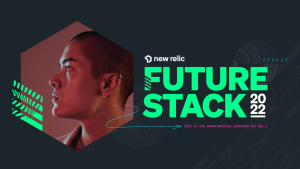How do you make money renting unicorns in the cloud? Especially when your CEO is a publicity-hungry megalomaniac with a comically limited understanding of what it takes to deliver on the outlandish promises he so casually makes?
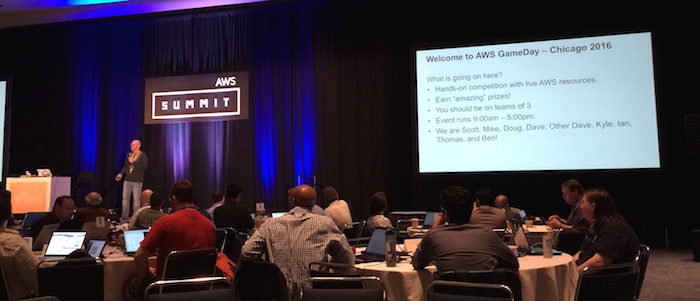
That question is the basic premise behind AWS GameDay, a clever, fun, and instructive daylong simulation designed to help Amazon Web Services (AWS) users figure out how to solve the kinds of problems they’re likely to face in the real world.
AWS describes GameDay this way:
It is your first day as the DevOps lead at the hot startup Unicorn.Rentals! Jump into the driver’s seat as the company moves towards launch and traffic starts to ramp up. You will work as part of a team to keep users happy and costs low by effectively managing your infrastructure in a live AWS environment during this competitive event! If you have what it takes to deliver highly available, highly scalable solutions in the cloud, and you are up for the challenge of running tech for a cutting edge startup on launch day, come join us for AWS GameDay! (AWS experience recommended. Laptop required.)
Meet The Waitlisters!
But that doesn’t fully convey the lighthearted, cooperative spirit of the hands-on event, which draws players of all levels of AWS experience. I was lucky enough to sit in with The Waitlisters, one of the more than 30 teams competing at the AWS GameDay at the AWS Summit in Chicago last month, and everyone I saw was working hard and learning a lot while having a great time doing it.
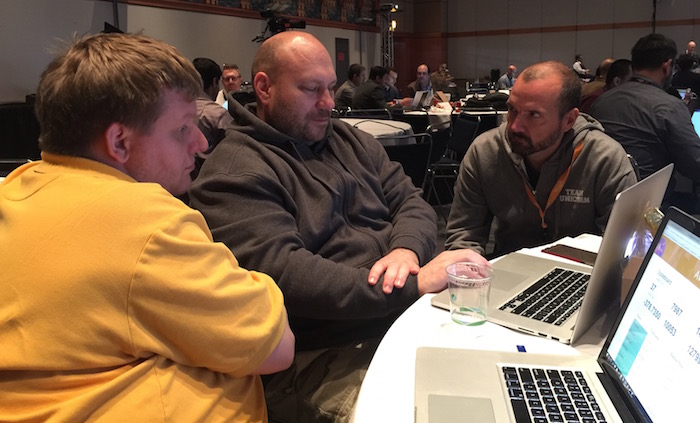
According to Scott Ward, a solution architect on the AWS partner team, GameDay debuted at the AWS re:Invent conference in Las Vegas last year, and has run a few times since then, but Chicago was its first appearance at an AWS Summit. There were more newbies at this particular event than at others, Ward said, but added that even AWS veterans typically learn new stuff during the course of the day.
“AWS GameDay is a hands-on competition with live data,” Ward explained. By setting up a “fake-real” environment for the teams to work in, players are free to try things out in a live environment with no actual risk. It’s unusual to have such a “carefree experience working in a live environment,” Ward said. Ironically, though, the one-day time frame is actually “kind of punitive,” he noted. In a real situation you'd probably have more time to deal with each problem, but the high-pressure environment adds to the excitement, and AWS GameDay’s goal is to entertain and make the learning experience as fun as possible.
So how does AWS GameDay actually work?
One tough assignment
After dividing attendees into teams of three, it was time to start the simulation. “Kyle” got on stage in the role of chairman and chief visionary of Unicorn.Rentals to begin “new hire orientation.” The entire engineering team had just left, he told the room, and it was up to the new folks to take over and get things done. “We like to make our workers compete against each other,” Kyle said, “so we can see who’s best and get rid of everyone else.”
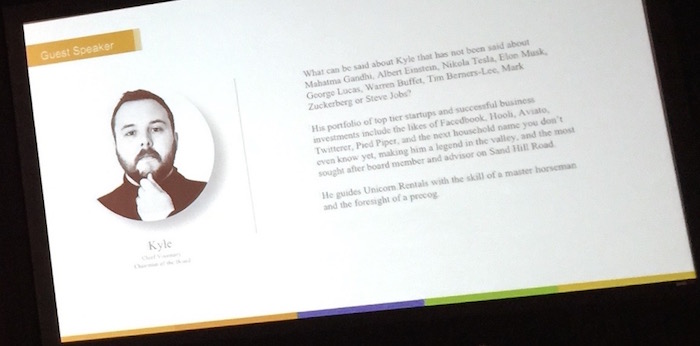
He explained that the company was rolling out a new unicorn rental service, and it was up to the teams to manage AWS to optimize response time and success rate at the lowest possible cost to serve the most customers with the highest profit. A giant visual scoreboard tracked the top teams’ rankings, along with profit earned, success rate, and infrastructure usage as part of the teams’ total score.
All the teams got access to their own AWS instances. There was no documentation, just a marked-up copy of the company’s runbook, ostensibly found under the foosball table in the break room and dismissed as “a tissue of lies.” To kick things off, Kyle tossed out this bombshell: “Why should we pay for load testing when we could have real customers? So we launched!”
And with that, the simulation was live.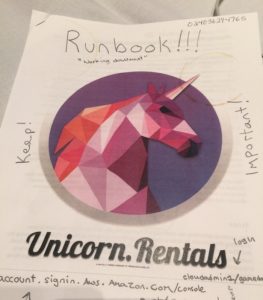
As intended, The Waitlisters immediately found the situation confusing, with two instances already running but not under their control. They worked feverishly to rebuild the web servers so they could fully control them, and to properly configure autoscaling groups and implement load balancing and caching. All while watching the scoreboard to see where they ranked.
Lots of preparation
"These guys did a lot of work to set this up," said Waitlister Ian Walmsley, from NewWave Telcom & Technologies. All the while, AWS staffers were wandering the room, helping teams understand problems and implement solutions. “It’s not like they give you instructions,” said Walmsley, noting that the players were really just given hints. “It's kind of cool!"
Then, at various points during the day, the AWS GameDay organizers tossed monkey wrenches in the mix. At one point, for example, Kyle announced that Unicorn.Rentals had just been featured on TV, and the load on the servers jumped through the roof. Additional roadblocks included security challenges and other potential “real world” issues.
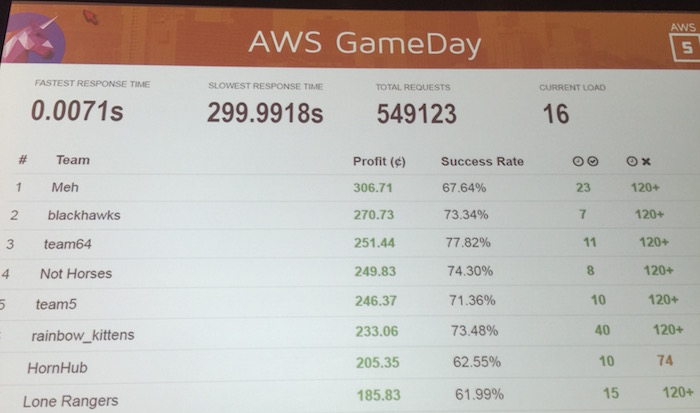
A new definition of winning
How did it all turn out? Because The Waitlisters were new AWS users, they spent most of the day languishing in the standings. But even the last place team, which won a novelty prize—to be fair, all the prizes were novelties—said they learned a lot in the process: “We picked up all kinds of new strategies!”
The Waitlisters were similarly impressed. “It’s as fake real as it can get,” joked Charles Hendrie, from Thomson Reuters. “These are real scenarios that could happen in real world.” Solving them “forced you to think about the troubleshooting part of it, to think really hard about why things aren’t working. There are a lot of moving parts, a lot of different things that have to be set up correctly.”
And, in a surprise twist, The Waitlisters were thrilled to win the Customer Obsession Award for staying focused on serving customer needs throughout the process. “I thought I was advanced,” Walmsley said, “but when the day started, it turned out I was just a beginner. It was a good day.”
이 블로그에 표현된 견해는 저자의 견해이며 반드시 New Relic의 견해를 반영하는 것은 아닙니다. 저자가 제공하는 모든 솔루션은 환경에 따라 다르며 New Relic에서 제공하는 상용 솔루션이나 지원의 일부가 아닙니다. 이 블로그 게시물과 관련된 질문 및 지원이 필요한 경우 Explorers Hub(discuss.newrelic.com)에서만 참여하십시오. 이 블로그에는 타사 사이트의 콘텐츠에 대한 링크가 포함될 수 있습니다. 이러한 링크를 제공함으로써 New Relic은 해당 사이트에서 사용할 수 있는 정보, 보기 또는 제품을 채택, 보증, 승인 또는 보증하지 않습니다.

